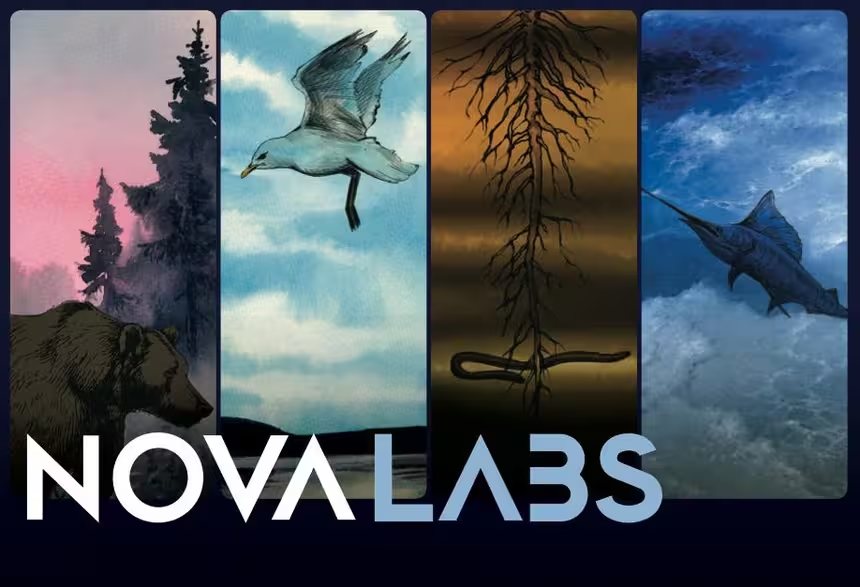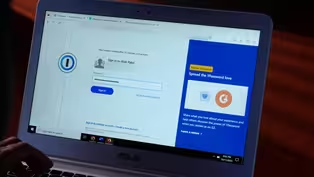
Is your phone listening to you?
Clip: Season 51 Episode 7 | 4m 25sVideo has Closed Captions
It doesn’t have to – advertisers may already have all the information they want to know about you.
A product you were just talking about pops up in an online ad. How? Advertising algorithms are so good that they may know what you want even before you do.
Problems playing video? | Closed Captioning Feedback
Problems playing video? | Closed Captioning Feedback
National Corporate funding for NOVA is provided by Carlisle Companies and Viking Cruises. Major funding for NOVA is provided by the NOVA Science Trust and PBS viewers.

Is your phone listening to you?
Clip: Season 51 Episode 7 | 4m 25sVideo has Closed Captions
A product you were just talking about pops up in an online ad. How? Advertising algorithms are so good that they may know what you want even before you do.
Problems playing video? | Closed Captioning Feedback
How to Watch NOVA
NOVA is available to stream on pbs.org and the free PBS App, available on iPhone, Apple TV, Android TV, Android smartphones, Amazon Fire TV, Amazon Fire Tablet, Roku, Samsung Smart TV, and Vizio.
Buy Now

NOVA Labs
NOVA Labs is a free digital platform that engages teens and lifelong learners in games and interactives that foster authentic scientific exploration. Participants take part in real-world investigations by visualizing, analyzing, and playing with the same data that scientists use.Providing Support for PBS.org
Learn Moreabout PBS online sponsorship- Okay, I know people say, "Oh, your phones aren't listening to you, but we were just talking about retro video games and here is an ad for home mini arcade machines, which looks kind of cool, but how did it know we were just talking about that?
Is my phone listening?
Is it a psychic?
What's happening?
- People always say, "I was talking about this product and then I saw an ad for it.
Matt, are they listening through my phone?"
And I'm like, "Well, they didn't hear you.
They didn't listen to anything.
The truth is actually more frightening."
You talked about that thing because they influenced you into having this conversation.
It's because the algorithm took you to this place, and that's the situation with our data.
- [Host] There have been some outlier examples of ad tech companies listening without consent, but that's against the law.
For the most part, advertising algorithms know you so well that they can predict what you would find interesting.
They're so good because they've studied all the data gathered about you from the data brokers.
- There's this kind of dossier that's being created about you as you're wandering around the internet and it's being used to decide what ad you see.
- [Host] Advertising fuels the economics of the internet, and advertising is fueled by you, me, us, our personal data.
So how do the algorithms actually work?
- You land on a webpage and that webpage gets your IP address, a unique identifier's return to a data broker.
That data broker looks up all the facts that were ever gleaned about you, a dossier that describes you.
- [Host] And then advertisers literally bid, they bid on you in a real-time auction based on the only lesson I remember from Econ 101: supply and demand.
- The demand-side platform that the advertiser is on says, "I have here an 18 to 34-year-old man child with an Xbox in Southern California.
Who wants to pay to cram something non-consensually into his eyeballs?"
And that takes place in a marketplace.
And you have advertisers on the other side who have standing orders.
They're like, "I want to advertise to 18 to 34-year-old man children in Southern California who own Xboxes."
And the marketplace conducts an automated high speed auction where it's just like, I'll pay so many fractions of a cent, I'll paid that plus 10%.
The high bidder gets to show you an ad.
- [Host] All of this happens nearly instantly, and it's possible because data brokers sort and cull personal data into super detailed consumer groups.
This is the process that delivers relevant, personalized ads for cute shoes or that new tea club, if you're into that sort of thing, which all the ads seem to know about you.
- [Haley] Here we have, for example, soccer mom.
- Okay, I might be able to identify with that.
A sporting good retailer could then go and check out a file on what a soccer mom's online activity is like.
- What are the things that they tend to spend money on and do they like to save?
Are there certain times of year where they might spend more or less?
- [Host] With all this data about soccer mom's consumer habits, retailers can send personalized ads with uncanny timing.
Some people like the results.
Soccer moms get deals, advertisers keep websites we love in business, but some consumer categories can be more concerning.
- Sometimes they'll have categories that are like, this person has erectile dysfunction, this person has a gambling problem.
This is a list of kind of people that are likely to fall for frauds.
So these can be really powerful and damaging lists.
- So this one, for example, diabetes interest.
- [Host] Oh, okay, healthcare demographic.
- The thing about that is like when you're thinking particularly about health data, that indicates that you're probably in a pretty sensitive situation.
- I'm now thinking about all the patients I take care of, and I shudder to think at the targeted ads that are deliberately targeting these individuals.
(text typing) - Data brokers have lists about sexual assault victims.
They have lists about dementia sufferers.
Those are some really concerning types of categories, and you could definitely see how an advertising company could take advantage of people on those lists.
(pensive music)
Are Your Online Passwords as Safe as You Think?
Video has Closed Captions
Clip: S51 Ep7 | 2m 22s | Your dog's name, birthday, and zip code do not make secure passwords. (2m 22s)
How to make your data more private online
Video has Closed Captions
Clip: S51 Ep7 | 4m 2s | You do have some control in how much data you share online. (4m 2s)
Video has Closed Captions
Preview: S51 Ep7 | 30s | Find out who’s using your data and what you can do about it. (30s)
Providing Support for PBS.org
Learn Moreabout PBS online sponsorship
- Science and Nature

Capturing the splendor of the natural world, from the African plains to the Antarctic ice.













Support for PBS provided by:
National Corporate funding for NOVA is provided by Carlisle Companies and Viking Cruises. Major funding for NOVA is provided by the NOVA Science Trust and PBS viewers.





